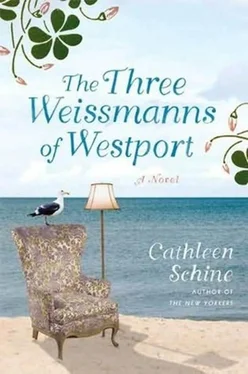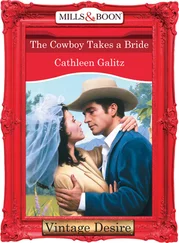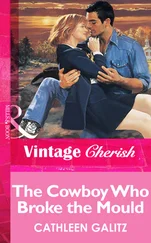On weekdays Annie went into the city, surprised by how much she enjoyed the commute. The train rattled on its suburban rails, filled with men and women, but mostly men, in dark suits. The uniformity of the sober colors, the smell of soap, the soft rustle of the newspapers in the mornings, that hour of fresh, gently rocking, clacking repose; then, ten hours later, the weary, wrinkled, communal escape from the long day of responsibility, the comfortable office dishabille of loosened ties and crumpled white shirts-Annie felt herself part of something, a cell in a great breathing bourgeois creature.
As for Betty, she read books with advice for grieving widows, one of which suggested she decorate a jar and then, with her children, write down happy memories of the deceased on slips of paper and place them inside. To facilitate the decoration of the Memory Jar, she immediately headed to Barnes & Noble to buy a book about decoupage. While there, she saw a book for golf widows and came home to declare that she must take up the game immediately.
"But, Mother, a golf widow is someone whose husband plays a lot of golf," Annie pointed out.
"Well, Josie plays golf," Miranda said. "On vacation. It's harder in the city, of course."
"Exactly," said Betty. "May he rest in peace."
Annie gave a defeated sigh, but the truth was, she enjoyed their company now as she never had before; more, certainly, than she had while growing up. As a little girl, she had not been unhappy, just cautious, adopting a quiet, personal camouflage to protect herself from her more flamboyant mother and sister. It was something she had always felt she'd shared with Josie: they were the ones who created the drab leafy background against which the other two blazed with gaudy color like tropical birds. Annie and Josie were the practical ones, too, the ones who remembered the napkins when Miranda and Betty decided on an impromptu picnic in the park, who thought to bring the umbrella when Miranda and Betty decided to walk across the Brooklyn Bridge on a cloudy day, who packed the map when Miranda and Betty had a sudden yen to see autumn leaves or spring flowers or Hyde Park or the waves crashing onto the beach at Montauk Point. Annie thought fondly of her stepfather for a moment. She almost wished he had died, she realized with shame, for then she would have been able to remember him as he had been, distant but in a quiet, patient, and reassuring way, someone she admired and looked up to and relied on. Instead, he was a living, unreliable, despicable deserter.
"I found the most wonderful jet bracelet at the consignment store on the Post Road," Betty was saying, holding out her wrist to her daughters.
Miranda peered at the bracelet. "Very Goth, Mom."
"Queen Victoria wore jet when she was in mourning for Prince Albert," Annie said. "Which was the rest of her life."
Betty nodded her approval.
"Of course, he was actually dead, unlike other widows' husbands I could name. She started a whole fashion."
"Well, now everyone wears black already," Betty said. "So I don't see what difference I could make. Nevertheless, the bracelet was only two hundred dollars. See how much I'm economizing?"
Annie wanted to shake her mother until her pretty little head wobbled on its aged neck. We are broke, she wanted to cry out. We do not have two hundred dollars to spend on baubles. But her mother was so wounded, and she was trying, in her odd and spendthrift way, to be brave. Annie took a deep breath. She put out the white linen napkins bought years ago in France, if she remembered correctly. "When the Mitfords' mother needed to economize," she said, "she found out how much the laundering of their napkins cost per week."
Normally Miranda would have commented on two pedantic outbursts in such a short period of time, but she was more indulgent of the Mitford family, awed by the number of memoirs, biographies, and scandals the sisters had generated.
"She thought it was too expensive," Annie continued, "so they just stopped using napkins."
"But think of the cleaning bills for their clothes," Betty said, clucking. "Although they could have used paper towels, I suppose…"
Betty and Joseph's housekeeper, a Brazilian woman named Jocasta who had retired last year, had always gotten the napkins snowy white and ironed them into crisply folded rectangles. When they first came to the cottage, Betty had suggested sending them to the dry cleaner, or at least the fluff-and-fold laundry downtown called the Washing Well, but Annie had put her foot down.
"We have a washer and a dryer. It's about the only thing that works in this house, so we might as well use it and not waste money."
She was, therefore, responsible for the napkins herself. They had acquired a few yellow stains, she noticed, and she certainly was not going to stand around for hours watching soap operas and ironing them the way Jocasta had. She placed the rumpled stained cloths beside her mother's good china. The napkins looked disgruntled, rebellious, like a crowd of disheveled revolutionaries. Maybe they should use paper towels, after all.
"Wash your hands before dinner, girls," Betty said.
Girls again. Could you re-create your childhood in a new place at an advanced age and without one of the key players? Annie wondered. For better or for worse, that's what they seemed to be doing. Oh, Josie, what were you thinking, leaving us here to play house, three place settings instead of four? "The Odd Trio" Miranda had dubbed them, but it was clear from the outset that they were, all three, the fussy one, each pursing her lips in disapproval of the other two, each missing the man who was not there.
"I can't imagine what all the neighbors think we're doing here, three old broads in this ramshackle house," Annie said as she watched a woman walk a big galloping black dog down the street.
"Oh, they think we're Russians," Betty said.
"Why?"
"Because that's what I told them."
Annie pressed her forehead against the window. Russians?
"Refugees!" Miranda said, delighted. "Cousin Lou must like that."
"Yes. I said we had all lost our poor husbands."
"How?" Annie asked.
"KGB, dear. How else?"
Those first few weeks of the Weissmanns' sojourn in Westport had about them both a reassuring and a festive air. The weather was holiday weather-unusually cool for late August, the blue of the sky clear and deep, a few bright clouds rolling by. There were ferocious showers in the afternoons now and then, as if they were in the tropics. Then the rain would pass, leaving the air fresher than ever, the light golden, clean, and rich. In addition, Betty was a wonderful cook in a traditional way that Annie and Miranda both associated with holidays, and it was Betty who did most of the cooking on the old stove. None of them was sure how this had happened-it had never been discussed or formalized in any way. But somehow, Betty was cooking for her children as she had done so many years before. The only exceptions came when the three women were commandeered for dinner at Cousin Lou's. Betty said it was cruel to deny him their company, particularly when he was being so kind about the cottage. She did not say that she was seventy-five years old and sometimes cooking dinner was tiring. Nor did anyone ask.
At one of these Cousin Lou dinners, Miranda was seated next to a tall, serious man, as stately as a house in his dark, smooth suit. He might have been nice-looking if he hadn't seemed quite so formal and hadn't been wearing a bow tie. But he was formal, he was wearing a bow tie, and after releasing the information that he was a semiretired lawyer, he said very little else. Miranda, who liked to listen and was so good at it, tended to interpret reticence as a personal insult. However, she was always willing to give people a second chance.
Читать дальше












